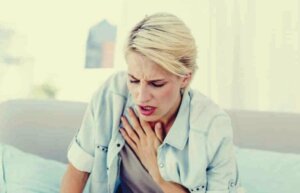What's the Connection Between Hyperventilation and Anxiety?


Written and verified by the psychologist Valeria Sabater
Trouble breathing, rapid heartbeat, dizziness, numbness, chest tightness, fear… Hyperventilation and anxiety are closely related. Feeling short of breath and not getting enough oxygen in your lungs can be a terrifying sensation. This can also be a direct consequence of some psychological disorders, which many people don’t know.
Not everyone relates this sensation with anxiety. People usually believe they have asthma or some other cardiorespiratory problem. Nevertheless, if you go to the emergency room or to see your doctor and they rule out any physical causes, you might be left feeling confused. So how can anxiety cause something so painful?
You might be forgetting that this anticipation mechanism to external and internal stimuli is directly related to breathing. The body’s priority, in response to anxiety, is to react to it. To do so, your heart rate speeds up and the amount of oxygen that your muscles receive increases. The goal is simple: to escape from the wild animal that’s after you.
Remember that hyperventilation isn’t an illness. It isn’t serious and you can’t die from it. It’s a side effect of anxiety that people with panic disorders often experience. Let’s delve right in.

Hyperventilation and anxiety: symptoms, characteristics, and how to manage it
Anxiety is one of the clinical conditions that causes the most physical symptoms. Studies conducted at the University of Health Sciences at the Chicago Medical School show that, on average, being highly sensitive to anxiety is a risk factor for panic attacks and, in turn, hyperventilation.
It’s important to note that hyperventilation or feeling short of breath can certainly be the sign of some other problem that isn’t purely emotional. Asthma, emphysema, and other lung issues can also explain this sudden breathing problem. Whatever the case, the best course of action is to see your doctor for a proper diagnosis.
Why do you hyperventilate when you feel anxious?
When you’re breathing faster than you need to meet your body’s oxygen requirements, you hyperventilate. This happens, as you might imagine, in stressful situations or when your anxiety reaches heightened or uncontrollable levels. You don’t realize that you’re breathing too fast and you create an imbalance in your oxygen levels.
- Hyperventilation disrupts the balance between oxygen and carbon dioxide.
- Your brain interprets this sudden drop in your blood’s carbon dioxide levels as a threat.
- Its goal is to stabilize the situation by reducing the levels of inhaled oxygen and exhaled carbon dioxide as quickly as possible.
- Your body does that by lowering the impulse to breathe. That is, your brain sends a message to reduce your breathing, which is where the asphyxiation feeling comes from.
- While you’re desperate to breathe, your body is actually making it harder, which obviously intensifies your panic and anxiety.
While it’s true that hyperventilation isn’t serious and no one has ever died from it, it’s very scary.
Symptoms of hyperventilation and anxiety
Hyperventilation and anxiety are closely related. When your emotional burden is high, your body reacts. Usually, the physiological response is intense.
The most difficult thing about these situations is that the experience of a panic attack or hyperventilation only increases your fear and anxiety. It’s a vicious cycle. The following are the most common characteristics of this hyperventilation and anxiety cycle:
- Hyperventilation caused by anxiety tends to last about 20 minutes.
- You’ll feel heightened physical and emotional tension.
- It might make you feel like you can’t breathe, as if you’re short of breath. The feeling of asphyxiation slowly worsens.
- Your heart beats faster and harder.
- You might feel a tingling sensation in your hands, legs, and around your mouth.
- Dizziness and tunnel vision are common.
- Sweating.
- Headache and fainting are also common.

How to cope with hyperventilation
When you hear the word hyperventilation, you probably picture someone breathing into a paper bag. While this is actually a good strategy, there are other aspects to think about as well.
- Hyperventilation isn’t an illness. It’s a symptom, and it’s important to know its source. The first step is to rule out physical conditions.
- If anxiety is causing your hyperventilation, try to identify what’s triggering your anxiety.
- Cognitive-behavioral therapy, rational emotive behavior therapy, cognitive therapy geared towards solutions for hyperventilation, or EMDR (eye movement desensitization and reprocessing therapy) can yield good results.
- On the other hand, if you’re having a hyperventilation attack, it’s important to focus on your breathing.
- If you breathe faster, the feeling that you’re choking will get worse. Instead, you have to slow down your oxygen intake.
- Breathing with your lips pursed, as if you’re blowing out a candle, can help.
- There’s also another strategy you can try. Cover-up one nostril and breathe through the other. This is another effective way to breathe more slowly.
Lastly, you can always try the classic paper bag technique. All you have to do is cover up your nose and mouth with the bag and start to breathe. That’ll help slow down your breathing and will also balance your CO2 levels. To conclude, make sure to figure out what’s triggering your breathing problems and get help.
Trouble breathing, rapid heartbeat, dizziness, numbness, chest tightness, fear… Hyperventilation and anxiety are closely related. Feeling short of breath and not getting enough oxygen in your lungs can be a terrifying sensation. This can also be a direct consequence of some psychological disorders, which many people don’t know.
Not everyone relates this sensation with anxiety. People usually believe they have asthma or some other cardiorespiratory problem. Nevertheless, if you go to the emergency room or to see your doctor and they rule out any physical causes, you might be left feeling confused. So how can anxiety cause something so painful?
You might be forgetting that this anticipation mechanism to external and internal stimuli is directly related to breathing. The body’s priority, in response to anxiety, is to react to it. To do so, your heart rate speeds up and the amount of oxygen that your muscles receive increases. The goal is simple: to escape from the wild animal that’s after you.
Remember that hyperventilation isn’t an illness. It isn’t serious and you can’t die from it. It’s a side effect of anxiety that people with panic disorders often experience. Let’s delve right in.

Hyperventilation and anxiety: symptoms, characteristics, and how to manage it
Anxiety is one of the clinical conditions that causes the most physical symptoms. Studies conducted at the University of Health Sciences at the Chicago Medical School show that, on average, being highly sensitive to anxiety is a risk factor for panic attacks and, in turn, hyperventilation.
It’s important to note that hyperventilation or feeling short of breath can certainly be the sign of some other problem that isn’t purely emotional. Asthma, emphysema, and other lung issues can also explain this sudden breathing problem. Whatever the case, the best course of action is to see your doctor for a proper diagnosis.
Why do you hyperventilate when you feel anxious?
When you’re breathing faster than you need to meet your body’s oxygen requirements, you hyperventilate. This happens, as you might imagine, in stressful situations or when your anxiety reaches heightened or uncontrollable levels. You don’t realize that you’re breathing too fast and you create an imbalance in your oxygen levels.
- Hyperventilation disrupts the balance between oxygen and carbon dioxide.
- Your brain interprets this sudden drop in your blood’s carbon dioxide levels as a threat.
- Its goal is to stabilize the situation by reducing the levels of inhaled oxygen and exhaled carbon dioxide as quickly as possible.
- Your body does that by lowering the impulse to breathe. That is, your brain sends a message to reduce your breathing, which is where the asphyxiation feeling comes from.
- While you’re desperate to breathe, your body is actually making it harder, which obviously intensifies your panic and anxiety.
While it’s true that hyperventilation isn’t serious and no one has ever died from it, it’s very scary.
Symptoms of hyperventilation and anxiety
Hyperventilation and anxiety are closely related. When your emotional burden is high, your body reacts. Usually, the physiological response is intense.
The most difficult thing about these situations is that the experience of a panic attack or hyperventilation only increases your fear and anxiety. It’s a vicious cycle. The following are the most common characteristics of this hyperventilation and anxiety cycle:
- Hyperventilation caused by anxiety tends to last about 20 minutes.
- You’ll feel heightened physical and emotional tension.
- It might make you feel like you can’t breathe, as if you’re short of breath. The feeling of asphyxiation slowly worsens.
- Your heart beats faster and harder.
- You might feel a tingling sensation in your hands, legs, and around your mouth.
- Dizziness and tunnel vision are common.
- Sweating.
- Headache and fainting are also common.

How to cope with hyperventilation
When you hear the word hyperventilation, you probably picture someone breathing into a paper bag. While this is actually a good strategy, there are other aspects to think about as well.
- Hyperventilation isn’t an illness. It’s a symptom, and it’s important to know its source. The first step is to rule out physical conditions.
- If anxiety is causing your hyperventilation, try to identify what’s triggering your anxiety.
- Cognitive-behavioral therapy, rational emotive behavior therapy, cognitive therapy geared towards solutions for hyperventilation, or EMDR (eye movement desensitization and reprocessing therapy) can yield good results.
- On the other hand, if you’re having a hyperventilation attack, it’s important to focus on your breathing.
- If you breathe faster, the feeling that you’re choking will get worse. Instead, you have to slow down your oxygen intake.
- Breathing with your lips pursed, as if you’re blowing out a candle, can help.
- There’s also another strategy you can try. Cover-up one nostril and breathe through the other. This is another effective way to breathe more slowly.
Lastly, you can always try the classic paper bag technique. All you have to do is cover up your nose and mouth with the bag and start to breathe. That’ll help slow down your breathing and will also balance your CO2 levels. To conclude, make sure to figure out what’s triggering your breathing problems and get help.
All cited sources were thoroughly reviewed by our team to ensure their quality, reliability, currency, and validity. The bibliography of this article was considered reliable and of academic or scientific accuracy.
- Donnell, C. D., & McNally, R. J. (1989). Anxiety sensitivity and history of panic as predictors of response to hyperventilation. Behaviour Research and Therapy, 27(4), 325–332. https://doi.org/10.1016/0005-7967(89)90002-8
- Bass, C., Chambers, J. B., Kiff, P., Cooper, D., & Gardner, W. N. (1988). Panic anxiety and hyperventilation in patients with chest pain: a controlled study. QJM: An International Journal of Medicine, 69(3), 949-959.
This text is provided for informational purposes only and does not replace consultation with a professional. If in doubt, consult your specialist.







